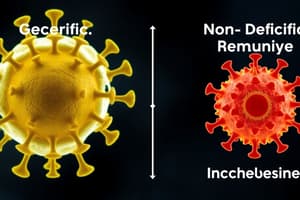Podcast
Questions and Answers
B and T cells can only recognize and bind antigen that has been processed and presented on MHC molecules.
B and T cells can only recognize and bind antigen that has been processed and presented on MHC molecules.
False (B)
Select the line of defense that displays immunologic memory.
Select the line of defense that displays immunologic memory.
- Third line defenses (correct)
- Nonspecific line defenses
- Second line defenses
- First line defenses
Cell surface markers play important roles in the specific immune response for the recognition of both self and nonself molecules.
Cell surface markers play important roles in the specific immune response for the recognition of both self and nonself molecules.
True (A)
Select the statements that accurately reflect the process of antigen binding of B and T cells.
Select the statements that accurately reflect the process of antigen binding of B and T cells.
Choose the phrase that describes MHC class I molecules.
Choose the phrase that describes MHC class I molecules.
The specific immune response:
The specific immune response:
T cells:
T cells:
Antigens:
Antigens:
After repeated exposure to foreign material, nonspecific immunity:
After repeated exposure to foreign material, nonspecific immunity:
_______ with antigen fragments displayed on their surfaces are known as antigen-presenting cells (APCs).
_______ with antigen fragments displayed on their surfaces are known as antigen-presenting cells (APCs).
When activated by antigen-presenting cells, helper T-cells release what cytokine that activates B-cells and cytotoxic T-cells?
When activated by antigen-presenting cells, helper T-cells release what cytokine that activates B-cells and cytotoxic T-cells?
Cytotoxic T-cells know that a cell is infected because:
Cytotoxic T-cells know that a cell is infected because:
B-cells differentiate into what type of cells that make antibodies?
B-cells differentiate into what type of cells that make antibodies?
Antigen-presenting cells release what cytokine to activate helper T-cells?
Antigen-presenting cells release what cytokine to activate helper T-cells?
A child with a genetic disorder that does not allow immature B-cells to develop would therefore not be able to make what?
A child with a genetic disorder that does not allow immature B-cells to develop would therefore not be able to make what?
Cytotoxic T-cells kill target cells by:
Cytotoxic T-cells kill target cells by:
The antibody producing progeny cells of a B-cell clone are called what?
The antibody producing progeny cells of a B-cell clone are called what?
Characteristics of good antigens include all of the following EXCEPT:
Characteristics of good antigens include all of the following EXCEPT:
There are no antigens that can stimulate B-cells directly.
There are no antigens that can stimulate B-cells directly.
Study Notes
Specific Immunity and Immunization
- B and T cells can recognize and bind to antigens without MHC processing; therefore, the statement is false.
- The third line of defense in immunity is characterized by immunologic memory, allowing for faster responses upon re-exposure.
- Cell surface markers are vital for the specificity of the immune response, enabling recognition of self versus nonself molecules.
- B cells have antibody molecules as their antigen receptors, while T cells require MHC to bind processed antigens.
- MHC class I molecules are expressed on all human nucleated cells, playing a critical role in antigen presentation.
- The specific immune response, unlike the first two lines of defense, involves memory of previously encountered antigens.
- T cells are primarily responsible for cell-mediated immunity, distinguishing their role from B-cells which produce antibodies.
- Antigens are defined as molecules recognized by B or T cells, not limited to microbes but applicable to various potential threats.
- Nonspecific immunity remains consistent in its response level even after repeated exposure to similar foreign material.
- Macrophages serve as antigen-presenting cells (APCs) by displaying antigen fragments on their surfaces for T cell recognition.
- Activated helper T-cells release interleukin-2, crucial for the activation of B-cells and cytotoxic T-cells in the immune response.
- Cytotoxic T-cells detect infections through disease-associated antigens displayed on infected cell surfaces.
- B-cells differentiate into plasma cells, which are responsible for antibody production in response to antigens.
- APCs also release interleukin-1 to activate helper T-cells, linking innate recognition with adaptive immune response.
- A genetic disorder preventing the development of immature B-cells results in an inability to produce antibodies, critical for adaptive immunity.
- Cytotoxic T-cells induce apoptosis in target cells through the release of cytotoxic chemicals, ensuring elimination of infected cells.
- The progeny of B-cell clones responsible for antibody production are known as plasma cells.
- Good antigens are typically large and diverse but large, repetitive molecules do not stimulate a strong immune response compared to others like whole cells or viruses.
- Contrary to the belief, some antigens can stimulate B-cells directly; thus, the statement claiming otherwise is false.
Studying That Suits You
Use AI to generate personalized quizzes and flashcards to suit your learning preferences.
Description
Test your knowledge with this quiz on specific immunity and immunization from Microbiology Chapter 15. Explore concepts such as B and T cells, lines of defense, and immunologic memory. Perfect for students looking to reinforce their understanding of immunological principles.




